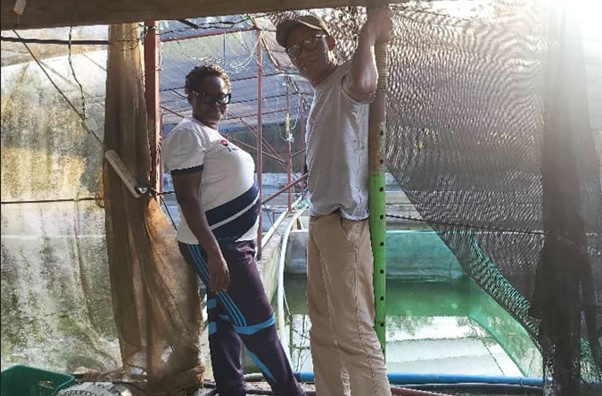NCF's financing brings innovative solutions for sustainable aquaculture in Tanzania
In Tanzania, aquaculture production is important for the livelihoods of people living in local communities. However, it heavily relies on expensive imported feed or poorly produced local alternatives, which not only strain the economy but also harm the environment.
To address the pressing challenge of unsustainable aquaculture production, Nordic Climate Facility (NCF) financed a project to develop an alternative solution to make aquaculture feed more sustainable and economically beneficial for the locals.
The project was a collaborative effort of three partners, who each contributed with their expertise to ensure the project’s success. They came up with an innovative idea to solve this challenge: Developing a new recipe for Tilapia feed that introduces Black Soldier Fly (BSF) larvae as the main source of protein.
Before turning the larvae into meal, they are grown by organic waste that would otherwise have ended up at landfills where the decomposition would have released greenhouse gases. Also, the financing from NCF helped them purchase machinery to setup a production line in Dar es Salaam for the testing and production of the new feed.
The Swedish University of Agricultural Sciences led the testing of ingredient nutritional value, designing feed profiles, and provided training and guidance on the feed production technology. BioBuu, a local company in Dar es Salaam, hosted the new production line and managed market outreach. Ruvu Fish Farms, also based in Tanzania, played a key role in conducting trials with smallholder farmers to test and ensure the quality of the feed produced.
Making an impact on the ground and in the ponds
By the end of the project, the partners had successfully identified a price-competitive and high-quality recipe in the lab and initiated its production of Tilapia feed. The product has been made available to the market and is starting to make an impact and a positive difference in the communities.
Mwajuma Abdul Magoma and her husband Hija own a one-acre plot of land in Mabwepande, Tanzania, where they produce Tilapia fish. They have previously struggled with the unreliable availability of fish feed in local markets, frequently encountering extended periods without sufficient feed due to shipment delays and other logistical challenges.
With the new feed processing plant and the locally produced feed, Mwajuma and Hija are now seeing a remarkable transformation. Their Tilapia now enjoy a consistent and balanced diet, leading to a significant boost in their overall harvest yields. Encouraged by the tangible results, Hija is now eager to leverage their success, not only by incorporating the feed into their own farming practices, but also by venturing into its distribution to fellow aquaculturists who face similar supply chain challenges, spreading the benefits of their breakthrough across the community.
Turning waste into value
In Africa, rapidly urbanising cities, including Dar Es Salaam, face significant challenges with waste management. The issue exacerbates due to inadequate waste management systems and lack of capacities to address the problem. A large amount of the waste is organic waste and when it is not processed, it poses a threat for the environment and the well-being of people.
This project, with the installation of the new production line using BSF larvae to process waste, has managed to provide a tangible and a sustainable solution that can help address the problem going forward.
In the final year of the project, the BSF larvae processed more than 400 tonnes of organic waste that would otherwise have ended up at the landfill. Instead, it was turned into a valuable ingredient in the Tilapia feed recipe, helping to maintain costs competitiveness without compromising the quality of the feed.
Read more about the project here.

Aquaculturists, Mwajuma Abdul Magoma and her husband Hija have benefitted from the project that produces sustainable feed for Tilapia fish.

